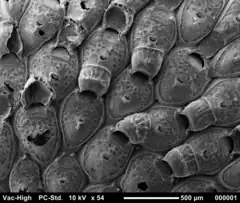Fenestrulina
Fenestrulina est un genre d'ectoproctes, bryozoaire formant des colonies encroutantes[2], de la famille des Microporellidae, classée dans l'ordre Cheilostomatida. Ces organismes contribuent, modestement, à la filtration de l'eau et au stockage du carbone. Ce genre est assez ubiquiste, trouvé des eaux tempérées à très froides (en zone polaire, antarctique notamment[3] - [4]), en passant par les eaux tropicales (ex : Fenestrulina commensalis découverte au Brésil à 5-10 m de profondeur en 2008).
Fenestrulina

Fenestrulina delicia (ayant colonisé une pierre trouvé dans les eaux anglaises).
| Règne | Animalia |
|---|---|
| Embranchement | Bryozoa |
| Classe | Gymnolaemata |
| Ordre | Cheilostomatida |
| Sous-ordre | Flustrina |
| Famille | Microporellidae |
- Fenestruloides Soule, Soule & Chaney, 1995[1]
Certaines espèces comme Fenestrulina delicia ont été introduites hors de leur aire naturelle de répartition (introduite en Europe dans ce cas).
On en connait quelques espèces fossiles[5].
Liste des espèces
- Fenestrulina asturiasensis[6]
- Fenestrulina barrosoi[7]
- Fenestrulina commensalis[8]
- Fenestrulina cervicornis
- Fenestrulina crystallina
- Fenestrulina delicia
- Fenestrulina juani
- Fenestrulina littoralis
- Fenestrulina malusii
- Fenestrulina malusii var. thyreophora [9]
- Fenestrulina rugula
Notes et références
- World Register of Marine Species, consulté le 16 juillet 2020
- Barnes, D. K. A., & Clarke, A. (1998). The ecology of an assemblage dominant: the encrusting bryozoan Fenestrulina rugula. Invertebr. Biol, 117, 331-340.
- Barnes D.K. (2008). A benthic richness hotspot in the Southern Ocean : slope and shelf cryptic benthos of Shag Rocks. Antarctic Science, 20(3), 263-270.
- Quirin Schiermeier (2017) | http://www.nature.com/news/artificial-warming-trial-reveals-striking-sea-floor-changes-1.22543 Artificial warming trial reveals striking sea-floor changes Researchers deliberately heated up a slice of the Antarctic sea bed to see how ecosystems responded] | Nature, 31 aout 2017 | URL : http://www.nature.com/news/artificial-warming-trial-reveals-striking-sea-floor-changes-1.22543
- Bock P (2013). Recent and Fossil Bryozoa: Fenestrulina Jullien, 1888.
- Alvarez J.A (1992) Fenestrulina asturiasensis sp. nov.(Bryozoa: Cheilostomida) from the northern coast of the Iberian Peninsula. Journal of the Marine Biological Association of the United Kingdom, 72(3), 727-730 |résumé.
- Alvarez J.A (1993). Fenestrulina barrosoi sp. nov.(Bryozoa: Cheilostomida) with a review of the genus Fenestrulina on the Iberian Peninsula. Journal of the Marine Biological Association of the United Kingdom, 73(4), 831-835.
- Vieira, L. M., & Stampar, S. N. (2014). A new Fenestrulina (Bryozoa, Cheilostomata) commensal with tube-dwelling anemones (Cnidaria, Ceriantharia) in the tropical southwestern Atlantic. Zootaxa, 3780(2), 365-374 |URL:https://www.researchgate.net/profile/Sergio_Stampar/publication/260966241_A_new_Fenestrulina_Bryozoa_Cheilostomata_commensal_with_tube-dwelling_anemones_Cnidaria_Ceriantharia_in_the_tropical_southwestern_Atlantic/links/54be9dad0cf2f6bf4e0381b1.pdf.
- Gordon, D. P. (1971). Zooidal budding in the cheilostomatous bryozoan Fenestrulina malusii var. thyreophora. New Zealand Journal of Marine and Freshwater Research, 5(3-4), 453-460 | URL:http://www.tandfonline.com/doi/pdf/10.1080/00288330.1971.9515397
Voir aussi
Articles connexes
Bibliographie
- Liu, H., Liu, X., & Sun, S. (2003). Seven new species of genus Microporella and Fenestrulina collected from the cultured shell and their floating cages in Chinese waters. Studia Marina Sinica, 45, 202-222.
- Craig S.F (1994). Intraspecific fusion in the encrusting bryozoan Fenestrulina sp. In Biology and Paleobiology of Bryozoans. Proceedings of the 9th International Bryozoology Conference. Olsen and Olsen, Fredensborg (pp. 51-54).
- Scholz J (1993). Indications for microbial clues for bryozoans when settling. Facies, 29(1), 107-118 |résumé.
Cet article est issu de wikipedia. Text licence: CC BY-SA 4.0, Des conditions supplémentaires peuvent s’appliquer aux fichiers multimédias.